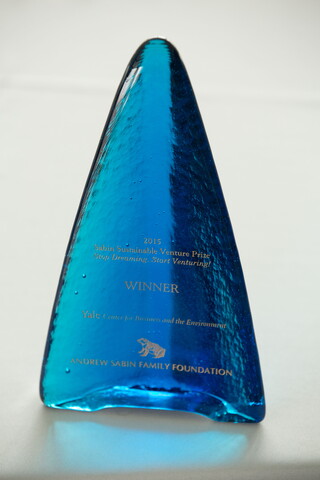The Realm of Possibility
Four teams of entrepreneurs, $25,000 in prize money

A good time was had by all—up in the rugged mountains of Central Asia, out two weeks in stealthy pursuit of a snow leopard. “That’s Andy’s idea of a fun vacation,” said Yale Center for Business and the Environment (CBEY) Program Director Stuart DeCew, referring to Andrew Sabin. The chase of such a rare sight is high-risk, high-reward.
[[{"fid":"1275","view_mode":"default","fields":{"format":"default","field_file_image_alt_text[und][0][value]":"","field_file_image_title_text[und][0][value]":""},"type":"media","link_text":null,"attributes":{"alt":"homE, one of four Sabin finalists, pitches its business idea.","style":"height: 267px; width: 350px; border-style: solid; margin: 10px; float: left;","class":"media-element file-default"}}]]
So it’s fitting that Sabin approached CBEY in 2008 to help build a program for socially minded entrepreneurs, who struggle with the same leopardian calculus: uncertain success through patience and persistence, the steady trailing specter of failure.
Now in its seventh year, the Sabin Sustainable Venture Prize annually awards $25,000 to support innovative for-profit business ideas that advance a sustainable way of life. This year marked “a rising tide” in the quality of applicants, according to DeCew, and the finals, held on April 17th, launched the inaugural, two-day Entrepreneurship Across Yale event.
Peter Boyd, Senior Advisor & Climate Lead on B Team and Founder of Time4Good, delivered the morning keynote, hammering home the vast and latent business opportunities inherent in environmental crises. “Find the biggest problem you can tackle,” he encouraged everyone present. After his talk, the four finalists presented their business ideas to a panel of five judges and a standing-room audience backed against the rear wall of the auditorium.
First to present was Grovio, a company that uses drones to finely target fertilizer application and prevent catastrophic crop loss from blight. Next, homE took the stage to describe a residential battery backup system that is cleaner and smarter than standard diesel generators—accessible through a smartphone and communicative with the electric grid. Third to present, Poda Foods described a 100-percent organic, gluten-free cricket protein for wholesale to corporate manufacturers. Finally, Tuckerman & Co. outlined their professional clothing line with a reduced environmental impact. (For a fuller description of each team, see below.)
[[{"fid":"1277","view_mode":"default","fields":{"format":"default","field_file_image_alt_text[und][0][value]":"","field_file_image_title_text[und][0][value]":""},"type":"media","link_text":null,"attributes":{"alt":"Sabin judge, Ralph Earle III, gives feedback","style":"margin: 10px; height: 233px; width: 350px; float: right;","class":"media-element file-default"}}]]
After each team exhausted 12 strictly timed minutes of presentation, the judges prodded, questioned and challenged every facet of the business plan: had the teams defined the right target market? What kind of new hires and advisory board would be required to successfully scale up? Were the scope, timelines and potential returns-on-investment ambitious enough to draw investors? And how would the product or idea both differentiate itself in crowded markets and protect competitive advantage?
At lunch, the judges retreated to pick a winner while audience members filled their plates and voted for an audience-choice award. Will Haughey, co-founder and “Chief Blockhead” of Tegu, delivered a lunchtime keynote, returning again to the pursuit of snow leopards. “I love to dwell in the realm of possibility,” Haughey said. Once an investment banker at Goldman Sachs, he left his job and partnered with his brother to found a toy company. The origin of the idea was not profitable business, but social benefit.
While growing up, Will had spent time doing humanitarian in Honduras. He knew the country suffered from high unemployment rates—up to 40 percent—and he wanted a mechanism to give Hondurans reliable employment. He and his brother finally decided to sustainably harvest Honduran wood and mill it locally into magnetic blocks. “We actually started out with a social problem,” he said, “and backed our way into a company.” It was a gamble, he said, and a large one, but beneath it all was what he called “a source of joy.” Entrepreneurs must “recognize the potential gain in risking loss.”
[[{"fid":"1278","view_mode":"default","fields":{"format":"default","field_file_image_alt_text[und][0][value]":"","field_file_image_title_text[und][0][value]":""},"type":"media","link_text":null,"attributes":{"alt":"The winning team, Poda Foods","style":"margin: 10px; float: left; height: 233px; width: 350px;","class":"media-element file-default"}}]]
The judges returned. They took their seats and an oversized cardboard check concealed behind a black drape was placed on an easel. The audience fell quiet. Andrew Sabin pulled the drape and, amid loud applause, Poda Foods walked down to shake hands—their second trip to the front, having already collected the audience-choice award.
Later, outside the classroom, pacing and talking rapidly on the phone, one of Poda’s co-founders described the day’s conclusion—months of work, persistence and patience, the wandering among doubts and uncertainties, and then, in a single moment, the crystallized reward. “It was surreal,” he said.
To see more photos from the day, click HERE.
FINALISTS
Grovio
Grovio aims to enable farmers to reduce fertilizer usage and prevent catastrophic loss of their crop due to blight. To that end, its creators present an autonomous unmanned aerial system that is capable of surveying fields with a multispectral imaging system and presenting actionable information.
homE
homE provides security during power outages by keeping essential appliances running. homE is a battery backup system that is cleaner and smarter than a diesel generator. Riding the rising tide of distributed energy storage and generation, homE will make electricity cheaper for ratepayers, and hasten renewables’ proliferation onto the grid.
Poda Foods
Poda Foods will sell food-grade cricket protein to food manufacturers for use in cricket-based food products. The company will offer 100-percent organic, gluten-free cricket protein for wholesale to corporate manufacturers. Poda will raise and process crickets in facilities in Portland, Ore.
Tuckerman
Tuckerman & Co. is a brand of high-quality professional clothing made with a reduced environmental impact. Tuckerman’s first product is an organic cotton dress shirt that prevents the use of nearly three-quarters of a pound of pesticides during the production process. Mission-driven by both inclination and design, Tuckerman is the first ever Benefit Corporation out of Yale. With more than $35,000 in initial sales, Tuckerman is poised to scale.